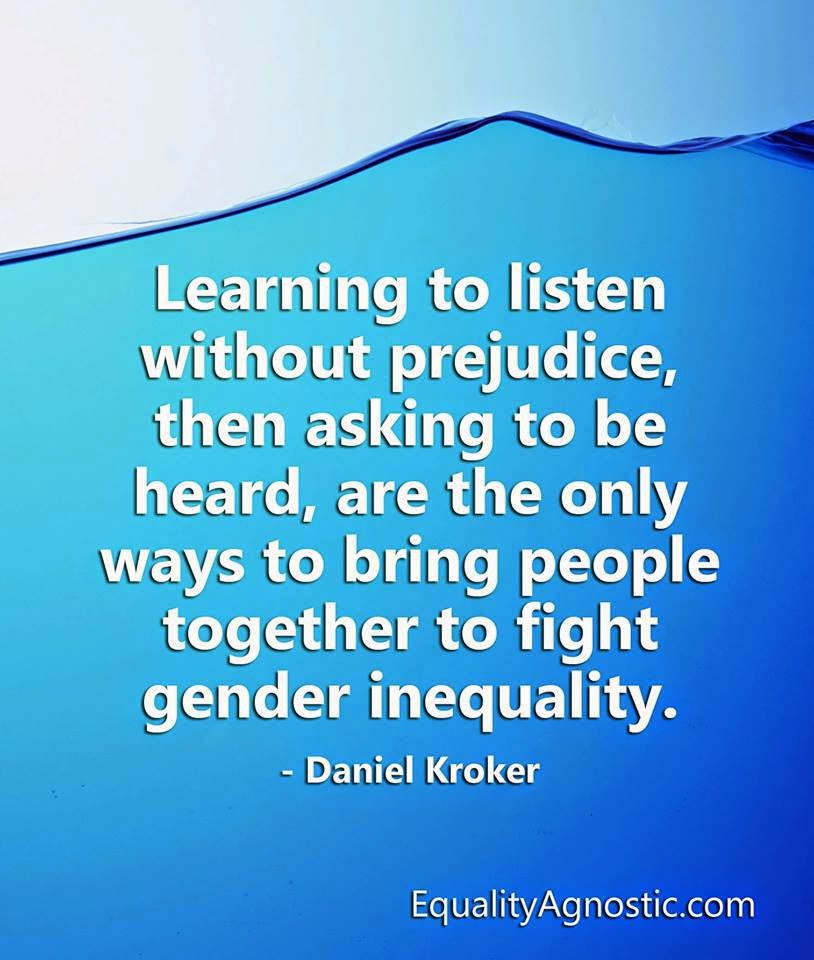This week is a lesson in gender equality debate strategy, though this information can be applied to any emotionally raw or difficult conversation.
Picture this scenario. A man and a woman meet in a bar and have this conversation. The woman says:
‘My ex-boyfriend was disempowering, physically and emotionally abusive. I felt like a child, or even a slave. I was financially dependent on my partner. I was cut out of all decisions regarding my future. So I broke up with him and then met my new boyfriend. Things are better now, but I still don’t feel equal, I still don’t feel safe.’
He hears her because through her choice of language he understands that he personally is not the cause of that pain. He replies:
She feels emotionally validated by his response. The woman outlines a list of things that he can do, even though he personally is not responsible for her suffering. The man then responds, ‘I know it’s not the same, but I’m having a hard time coping with a particularly messy divorce. I’m frightened I’ll never recover financially, terrified that I’ll lose my kids, but feel like I have to pretend I’m fine—do you mind if I talk to you about it?’
Having been heard and realising that everyone’s pain is their own, the woman listens to what the man has to say, understanding that ‘different does not equal less’ and by inference ‘different does not equal more’—everyone’s pain is their own. Just because we experience different pain and struggle doesn’t mean that you can’t listen and help; choosing to listen and or help does not devalue or diminish your own issues.
This is the gender equality debate that is my goal and I would be proud if it was yours too. It is rarely the conversation that is had and that is because, normally, if this issue matters to you, you are in pain.
Consider how that same conversation would have gone had the woman said to the man she just met ‘Every man I meet…’ or if the man had responded with, ‘Pfft, you think that’s bad – you should meet my ex-wife.’
The choice to listen without prejudice, without ‘score-keeping’, is the most difficult aspect of gender equality debate. If you start a conversation on the topic, ask questions about how the other person feels and then wait to hear them out. Wait for a natural pause in their dialogue, without cutting in, then ask if they have finished. Once they feel they have said all they wish on the topic, ask for permission to add your thoughts in the same way.
No one wants to be preached at.
No one wants to be lectured.
By asking, you have given your audience a feeling of control and participation in the conversation. That feeling of control and participation automatically reduces a person’s natural level of defensiveness.
When you respond, see if you can use language that doesn’t box that person into the same category as the thing that hurts you or the issue you are trying to overcome. In your response state the issue you wish to overcome, while avoiding words like ‘but’ or ‘however’. These words infer that your issue carries more weight, which in turn devalues their issue and raises a person’s defences again.
Each time you listen without prejudice, each time you are heard on an issue, you will have raised awareness and reduced someone’s pain, and a reduction in human suffering is ultimately the objective of all people passionate about gender equality.

